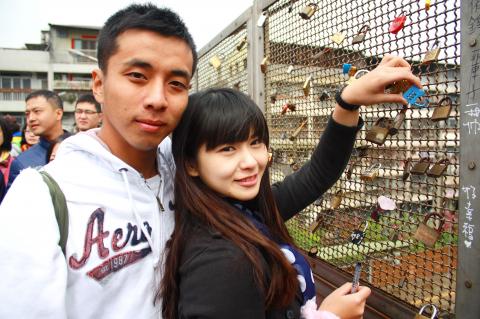Greater Taichung’s “love-locks bridge” will be preserved and moved to another location thanks to a campaign by scores of netizens to save it from demolition, the Railway Reconstruction Bureau announced last week.
Located next to the railway station in Fongyuan District (豐原), the fencing on the so-called “love-locks bridge” is covered with thousands of padlocks inscribed with wishes from couples hoping for long, loving relationships, as well as from family members hoping for a safe year.
About a decade ago, rumors began circulating that bridges that cross over railway tracks retain energy from the trains that pass beneath them and grant people their wishes.

Photo: Chang Jui-chen
Since then, throngs of people, especially couples, have inscribed all sorts of wishes on padlocks and attached them to the iron fencing, giving the bridge the name “love-locks bridge,” or “heart-locks bridge.”
However, in autumn last year, it looked like the bridge would be torn down to make room for an elevated railway project.
Following the news, Jen She Association chief Lin Hsuan-hung (林宣宏) and netizen Lin Shou-shan (林壽山) joined hands to launch a campaign and an online petition, calling for the bridge to be preserved.
On Monday, as several netizens arrived at the bridge hoping to attach their locks, Lin surprised the visitors with some good news.
“Officials from the bureau paid me a visit on Thursday and told me they have decided that public art funds will be used to preserve the ‘love-locks bridge’ by moving it to a different location,” Lin said.
“The officials also said they anticipate that the bridge will be transformed into public artwork for local residents,” Lin said.
It is the only “love-locks bridge” in the country, and is only one of five in the world, Lin said. The other four are in South Korea, Japan, Germany and Italy.
However, Yeh Jen-ho (葉仁和), stationmaster at Fongyuan Railway Station, said the bridge would lose its meaning if it were moved to a location away from the trains.
“Still, it’s the mighty power of the ‘love-locks bridge’ that fulfilled my wish to receive the much-needed funds to ensure its preservation,” Yeh said.
Translated by Stacy Hsu, Staff Writer

A magnitude 4.9 earthquake struck off Tainan at 11:47am today, the Central Weather Administration (CWA) said. The hypocenter was 32.3km northeast of Tainan City Hall at a depth of 7.3km, CWA data showed. The intensity of the quake, which gauges the actual effect of a seismic event, measured 4 in Tainan and Chiayi County on Taiwan's seven-tier intensity scale, the data showed. The quake had an intensity of 3 in Chiayi City and County, and Yunlin County, while it was measured as 2 in Kaohsiung, Nantou County, Changhua County, Taitung County and offshore Penghu County, the data showed. There were no immediate reports of

Weather conditions across Taiwan are expected to remain stable today, but cloudy to rainy skies are expected from tomorrow onward due to increasing moisture in the atmosphere, according to the Central Weather Administration (CWA). Daytime highs today are expected to hit 25-27°C in western Taiwan and 22-24°C in the eastern counties of Yilan, Hualien, and Taitung, data on the CWA website indicated. After sunset, temperatures could drop to 16-17°C in most parts of Taiwan. For tomorrow, precipitation is likely in northern Taiwan as a cloud system moves in from China. Daytime temperatures are expected to hover around 25°C, the CWA said. Starting Monday, areas

Taiwan has recorded its first fatal case of Coxsackie B5 enterovirus in 10 years after a one-year-old boy from southern Taiwan died from complications early last month, the Centers for Disease Control (CDC) said yesterday. CDC spokesman Lo Yi-chun (羅一鈞) told a news conference that the child initially developed a fever and respiratory symptoms before experiencing seizures and loss of consciousness. The boy was diagnosed with acute encephalitis and admitted to intensive care, but his condition deteriorated rapidly, and he passed away on the sixth day of illness, Lo said. This also marks Taiwan’s third enterovirus-related death this year and the first severe

A Taiwanese software developer has created a generative artificial intelligence (AI) model to help people use AI without exposing sensitive data, project head Huang Chung-hsiao (黃崇校) said yesterday. Huang, a 55-year-old coder leading a US-based team, said that concerns over data privacy and security in popular generative AIs such as ChatGPT and DeepSeek motivated him to develop a personal AI assistant named “Mei.” One of the biggest security flaws with cloud-based algorithms is that users are required to hand over personal information to access the service, giving developers the opportunity to mine user data, he said. For this reason, many government agencies and